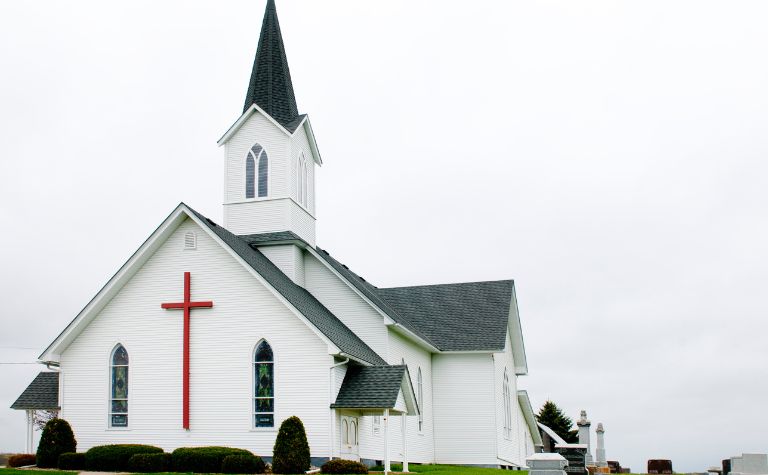“Protestant” and “Lutheran” are two terms associated with Christianity, but for many, it’s unclear what the differences are between them. While both names describe Christians who have certain shared beliefs and practices, there are important differences between them.
“Protestant” is the name of the 16th-century reform movement born in Europe that decried abuses and excesses in the Catholic church. “Lutheran” is one of the traditions born from the Protestant Reformation. Lutheranism’s founder, Martin Luther, is often credited with igniting the Reformation.
How did the Protestant movement and the Lutheran tradition start? What are the differences between their beliefs and worldview? Do both believe in the Trinity, the deity of Christ, and the Holy Spirit? Keep reading to learn more.
Also, see Orthodox vs. Catholic vs. Protestant: Differences to learn more.

Protestant vs. Lutheran: Overview
Because the Lutheran tradition is part of the Protestant movement, there is a significant overlap regarding their origins, beliefs, and practices. (Also see Seven Symbols of Protestant Christianity)
However, though all Lutheran denominations and churches are Protestant, not all Protestants are Lutherans. Traditions like Methodist, Baptist, Presbyterian, Episcopalian, and Assemblies of God are also Protestant.
| Lutheranism | Protestantism | |
|---|---|---|
| Origin | Martin Luther (1483-1546), 16th-century Germany | 16th-century Europe, especially Germany, under the reforms of Martin Luther (1483-1546). |
| Meaning of the name | Writings and sermons of Martin Luther, especially the 95 Theses, Calvin’s The Institutes of the Christians Religion, and many others | The word “Protestant” comes from the Latin word protestari, meaning “to bear witness.” |
| Early influencer | Philip Melanchthon 1497-1560), 16th century Germany | Martin Luther, John Calvin of France (1509-1564), and Ulrich Zwingli of Switzerland (1484-1531) |
| Significant writing outside the Bible | Luther’s shorter and large catechism, the Book on Concord, the Augsburg Confession | Writings and sermons of Martin Luther, especially the 95 Theses, Calvin’s The Institutes of the Christians Religion, and many others. |
| Organization | Protestant churches can be organized differently, such as congregationalism, presbyterianism, or episcopalianism. | Protestant churches can be organized in different ways, such as congregationalism, presbyterianism, or episcopalianism. |
| What are the largest denominations in the tradition today? | Evangelical Lutheran Church in America (ELCA); Lutheran Church-Missouri Synod (LCMS) see charts below | Southern Baptist Convention, the United Methodist Church, the Evangelical Lutheran Church of America, and the Assemblies of God (see more below) |
| Theological and Social worldview | It depends on the synod; the LCMS is conservative; the ELCA is moderate to liberal depending on the congregation see charts below | Protestants may be liberal or conservative theologically or socially. |
Because Martin Luther ignited the Protestant Reformation, all Protestant denominations trace their roots to him. Not all Protestants agree with all aspects of Lutheran theology, but they agree about the foundational convictions of the Protestant movement, such as the authority of Scripture and that salvation is by grace through faith in Christ alone. (Also see Did Protestants Remove Books from the Bible?)

Protestantism and Lutheranism Beliefs Compared
Lutheranism shares many beliefs with other Protestant traditions, like the inspiration of Scripture, the Trinity, and that there are two sacraments, the Lord’s Supper and water baptism. (Also, see Protestant vs. Methodism: What’s the Difference?)
Lutheranism also has some views that are unique among Protestants, the foremost of which is consubstantiation.
What is consubstantiation? From the Latin words con, meaning “with,” and substantia, meaning substance, consubstantiation describes a view of the Lord’s Supper.
Consubstantiation, which is the view Martin Luther taught, argues that the bread and cup don’t change into the body and blood of Christ, like in the Catholic view called transubstantiation. (Also, see Why Don’t Protestants Believe In Transubstantiation?)
Instead, the elements co-exist: the bread with Christ’s body and the cup with his blood. A common way to describe consubstantiation is to say that Christ is present “in, with, and under” the bread and cup.
| Lutheranism | Protestantism | |
|---|---|---|
| View of the Bible | Conservative synods affirm the authority, inspiration, and inerrancy of Scripture; moderate-liberal synods view the Bible as a helpful guide to belief and practice, but an imperfect one at best. | One of the hallmarks of Protestant tradition is the authority of Scripture over and above church tradition. Protestants historically believe in the inspiration and authority of Scripture. |
| View of God | Lutherans believe in the Trinity; there is one God who exists in three persons. The Father, Son, and Holy Spirit are each fully divine. | Protestants believe in the Trinity; there is one God who exists in three persons. The Father, Son, and Holy Spirit are each fully divine. |
| View of Christ | Jesus is the second person of the Trinity. He is God in human flesh. He is 100% God and 100% man. Jesus was born of a virgin, lived a sinless life, died as an atonement for sin, and was physically resurrected on the third day. | Jesus is the second person of the Trinity. He is God in human flesh. He is 100% God and 100% man. Jesus was born of a virgin, lived a sinless life, died as an atonement for sin, and was physically resurrection on the third day. |
| View of Salvation | Neither Calvinist nor Arminian, but “Lutheran”; conservatives believe in election but don’t define it the same way as Calvinists. | Protestants believe that salvation is by grace through faith in Christ alone. |
| View of the Holy Spirit | The Holy Spirit is the third person of the Trinity. He is fully divine. The Spirit applies the salvation that the Father planned and that the Son earned for sinners. He bestows spiritual gifts on believers that they are to use for the edification of the Church. Lutherans are historically cessationist, not Pentecostal. | The Holy Spirit is the third person of the Trinity. He is fully divine. The Spirit applies the salvation that the Father planned and that the Son earned for sinners. He bestows spiritual gifts on believers that they are to use for the edification of the Church. Some Protestants are Pentecostal, and some aren’t. |
| View of the Sacraments | There are two: baptism and the Lord’s Supper or communion; they don’t automatically convey grace like in Catholicism. | Protestants believe there are two sacraments: water baptism and the Lord’s Supper. Protestants do not always agree on who should be baptized or the nature of the bread and cup. |
| View of the Lord’s Supper | The real body and blood of Christ are believed to be “in, with, and under” the bread and cup; this view is often called “consubstantiation”* | Generally, Protestants believe the Lord’s Supper is a continual practice that Christ started before his death and resurrection. Protestants don’t agree about the nature of the bread and cup. |
| View of the Baptism | Pastors baptize infants who receive the gift of regeneration of the Holy Spirit; faith is necessary for grace to be conveyed (unlike Catholicism) | Generally, Protestants believe baptism identifies a person with the death and resurrection of Christ (Rom. 6:3-5) and obedience to Christ. It also signifies their inclusion into the church community (Acts 2:38-47). Protestants don’t agree about who (children or adults) should be baptized and how (sprinkling or immersion). |
| View of the end times | Lutheranism is Amillennial, meaning it interprets the 1,000-year period described in Revelation 20:1-6 figuratively and defines it as the time between Christ’s first and second coming (i.e., the Church Age). | Protestant churches may be premillennial, postmillennial, or Amillennial. |
*Also see Why Do Protestants Use Grape Juice At Communion?

What are the Largest Lutheran Denominations?
| Name | Members/ Churches | Founded |
|---|---|---|
| Evangelical Lutheran Church in America | 4.1 million; 9,800 | 1988 |
| Lutheran-Church Missouri Synod | 2.2 million; 6,100 | 1847 |
| Wisconsin Evangelical Lutheran Synod | over 385,000; 1,200 | 1850 |
| Lutheran Congregations in Missouri for Christ | over 300,000; over 700 | 2001 |
| North American Lutheran Church | over 140,000; over 400 | 2010 |
Please see the related articles below.
References:
[1] Source
[2] Source
[3] Source
Related Questions
Protestantism and Eastern Orthodoxy are two of the three historical branches of the Christian faith, along with Roman Catholicism. Though the Orthodox tradition is approximately 500 years older than...
Christianity is an important part of the American story in its various denominational expressions. Some denominations came to America from Europe, while others started on American soil. The size of a...
